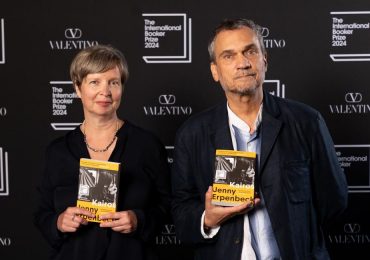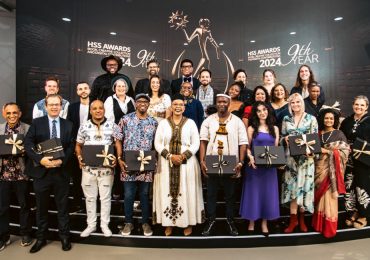Header image: The Africa shortlist, Aba Asibon (Ghana), Innocent Chizaram Ilo (Nigeria), Caleb Ozovehe Ajinomoh (Nigeria), Alboricah Tokologo Rathupetsane (South Africa), ML Kejera (The Gambia)
The shortlist of twenty ‘outstanding’ stories has been announced for the 2020 Commonwealth Short Story Prize, known as the world’s ‘most global literature prize’.
The writers come from fifteen countries across the Commonwealth including, for the first time, The Gambia.
‘Often humorous and always intensely moving, the twenty stories range from speculative worlds to the everyday,’ Commonwealth Writers says. ‘They describe love and loss, death and legacy, the individual facing down prejudice; travel, displacement, and the search for home.’
The Commonwealth Short Story Prize is awarded annually for the best piece of unpublished short fiction from any of the Commonwealth’s fifty-four member states. It is the only prize in the world where entries can be submitted in Bengali, Chinese, English, French, Greek, Malay, Portuguese, Samoan, Swahili, Tamil and Turkish. Short stories translated into English from other languages are also eligible.
‘Such linguistic diversity in a short story prize in part reflects the richness of the Commonwealth, not least its many and varied literary traditions,’ Commonwealth Writers says.
The stories on the 2020 shortlist were selected from 5107 entries from forty-nine Commonwealth countries.
Regional winners receive £2500 (about 58,000) and the overall winner receives £5000 (about R117,000).
Chair of the Judges Ghanaian writer and editor Nii Ayikwei Parkes says:
‘Beyond their basic plots, the best stories are elevated by the language in which they are told. In this judging process, the fine language has also undoubtedly been that of my fellow judges, who add nuance, colour, fun and a profound knowledge of trends in their regions to discussions.
‘The result of the time we’ve spent indulging in the submissions to the Commonwealth Short Story Prize is a shortlist of twenty unique stories.
These stories, drawn from all over the globe, are as harrowing as they are uplifting, funny while being tragic—and defiant in the face of politics, bigotry and injustice. But, crucially, at a time like this, with the world beset with myriad challenges and a devastating virus, the stories are grounded in faith, hope and the humanity we all share.’
The 2020 Commonwealth Short Story Prize shortlist
Africa
- ‘The Dawning’ by Aba Asibon (Ghana)
A housekeeper works to balance the mourning of her beloved employer with carrying out her domestic duties, the most challenging of which is the nurturing of her dejected madam.
‘The shrine itself is modest, an old coffee table covered in about a yard of scalloped Chantilly lace. On the table sits a thirty-by-twenty-four-inch portrait of Mr Atta wearing his signature pensive expression, flanked by a vase of fresh flowers and a brass holder filled with incense sticks. The shrine is Mansa’s handiwork, a befitting memorial for a good man.’
Aba Amissah Asibon was born and raised in Ghana. Her short fiction has been published in Guernica, The University of Chester’s Flash Magazine and The Johannesburg Review of Books. She was also longlisted for the 2016 Short Story Day Africa Prize for Short Fiction and featured in the prize’s anthology Migrations. Aba currently lives in Malawi and is working on her debut novel.
- ‘When a Woman Renounces Motherhood’ by Innocent Chizaram Ilo (Nigeria)
A woman and her mother bond in the face of a sexist tradition.
‘Read this between clenched teeth, a taut smirk plastered on your face. Try to taste each word as it escapes your mouth, like air.
‘When a woman renounces motherhood, no one asks her why she did it. How dare you give up on a beautiful thing; nature’s call embedded in your vagina, crested on your breasts?’
Innocent Chizaram Ilo is an Igbo writer from Nigeria. Their works interrogate gender, class, memory, and sexuality and have been published in literary magazines across four continents. They are a finalist of the Gerald Kraak Award, Short Story Day Africa, and Wilbur Smith Author Of Tomorrow prizes. They have also won the Africa YMCA and Oxford Festival of the Arts short story contests. Their works have been published in Fireside Magazine, Overland, Strange Horizons, Cosmic Roots And Eldritch Shores, Cast Of Wonders, Transcendent 4: Best Of The Year Transgender Speculative Fiction Anthology, Short Story Day ID Anthology, and Heart Of The Matter: Gerald Kraak Award Anthology.
- ‘Rites Evasion Maneuvers’ by Caleb Ozovehe Ajinomoh (Nigeria)
Three brothers turn tricks at their father’s funeral.
‘Funerals are expensive, because the living have made dying an industry. Brother One, a grief consultant, knows this better than anyone. In fact, those words can be found on the bottom of the slim leaflets he distributes at Rites Evasion Maneuvers …’
Caleb Ozovehe Ajinomoh was awarded a residency at Ledig House, Art Omi, New York in 2018. He has won the W Morgan and Lou Claire Rose Award, as well as the LD Clark and LaVerne Harrell Clark Award. His work appears in QZ, The Offing, Necessary Fiction, Catapult, adda, AFREADA, CircleShow, AWP Writers’ Chronicle, and the Goethe Institute anthology, Limbe to Lagos. He is a fiction candidate at Texas State University in the United States.
- ‘The Faraway Things’ by Alboricah Tokologo Rathupetsane (South Africa)
This story is a journey of life through Lesedi’s eyes, a young boy whose mental limitations have prevented him from accepting a tragic event in his life.
‘Lesedi knew he wasn’t right in the head. He heard someone say it at least once every day. “There goes Mokgadi’s son,” they would always mutter, “don’t mind him, he’s not right in the head.” Not that he understood why his head wasn’t right. Everyone said it, but no one had ever bothered to explain their reasons for thinking it. Although he was sometimes curious about it, he never asked because that would require talking—which he preferred to avoid.’
Alboricah Tokologo Rathupetsane is a 28-year-old writer from South Africa whose passions are writing and art which she uses to express her feelings and ideas. Alboricah grew up in a rural village in the Province of Limpopo, South Africa, and currently lives and works in Port Elizabeth.
- ‘Fatou vs the Dictator’ by ML Kejera (The Gambia)
Fatou, a young woman raised in The G’s diaspora, is in an airport awaiting her flight home. She comes across her recently ousted dictator and debates whether she should confront him.
‘He wore a white boubou and blue jeans. Official press releases had given him an ineffable supremacy that reality shattered. Without the propaganda to smoothen him out, he was an ugly man. Wrinkles lined his pitch black face and he carried a globular stomach. But, whenever he shifted in his seat, Fatou saw the sinewy remnants of the 31 year old general—more lean muscle than man—who had overthrown The G’s first democratically elected president.’
ML Kejera is a Chicago-based author from The Gambia. Though born in Bakau, he left the country with his family in 1999. He has lived in Senegal, Saudi Arabia, Tunisia, and the US. He speaks English and French and can understand Mandinka. His work has been published in riverSedge, The Cafe Irreal, Sleaze Mag, Strange Horizons, Riddled With Arrows, Popula, PanelxPanel and The Outline. He is currently working on a short story collection about The G, for which he is seeking representation.
Asia
- ‘The Shedding’ by Nafisa A Iqbal (Bangladesh)
- ‘The Great Indian Tee and Snakes’ by Kritika Pandey (India)
- ‘The Teeth on the Bus Go Round and Round’ by Dinesh Devarajan (India)
- ‘Ouroboros, Ouroboros’ by Sharmini Aphrodite (Malaysia)
- ‘An Instruction Manual—How to Find Your Vagina’ by Maham Javaid (Pakistan)
Canada and Europe
- ‘Provenance’ by Jason Jobin (Canada)
- ‘The Eternally Obvious is Not Obvious to Me’ by Marcia Walker (Canada)
- ‘To Xreos’ (‘The Debt’) by Nikolas Kyriacou (Cyprus) translated from the Greek by Lina Protopapa
- ‘Wherever Mister Jensen Went’ by Reyah Martin (United Kingdom)
Caribbean
- ‘Mafootoo’ by Brian S Heap (Jamaica)
- ‘Cash and Carry’ by Sharma Taylor (Jamaica)
- ‘Finger, Spinster, Serial Killer’ by Brandon Mc Ivor (Trinidad and Tobago)
Pacific
- ‘The Art of Waving’ by Andrea E Macleod (Australia)
- ‘Attention’ by Catherine Chidgey (New Zealand)
- ‘A Breath, a Bunk, a Land, a Sky’ by Fiona Sussman (New Zealand)
Watch a video of the shortlisted authors introducing themselves and speaking about how their lives have been affected by Covid-19:
The 2020 shortlisted stories will be published online on the online magazine of Commonwealth Writers, adda, which features new writing from around the globe.
The judges will go on to choose a winner for each of the five regions. These regional winners will be announced on Tuesday 2 June 2020, before being published online by the literary magazine Granta. The overall winner will be announced on Tuesday 7 July.
The 2020 judging panel is chaired by the Ghanaian writer and editor Nii Ayikwei Parkes. The other panellists are: South African writer and musician Mohale Mashigo, executive director of the Singapore Books Council William Phuan, Canadian author Heather O’Neill, Trinidadian scholar and writer Elizabeth Walcott-Hackshaw and Australian writer and arts organiser Nic Low, who was himself shortlisted for the 2012 Commonwealth Short Story Prize.
Because of the current Covid-19 pandemic, Commonwealth Writers has commissioned a short film of the shortlisted authors sharing their insights into how they have been affected by the virus in different parts of the world under the hashtag #StoriesToConnectUs. The film will be available to watch from 21 April on the Commonwealth Writers website www.commonwealthwriters.org.
Anne T Gallagher AO, Director-General of the Commonwealth Foundation, the intergovernmental organisation which administers the prize, says:
‘Once again, the short story prize has confirmed the depth and diversity of the literary culture across the Commonwealth of Nations: 54 countries that together represent over two billion people. We celebrate the authors on this shortlist for their technical and creative skill. Perhaps even more importantly, we thank them for the timely reminder of the power of storytelling, not least its ability to comfort, inspire and heal.’





